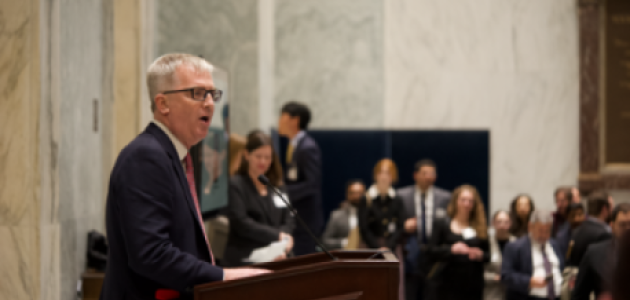In this week's edition, the U.S. shifts its import focus from China to Mexico amid geopolitical changes and pandemic disruptions, marking a significant trade dynamic shift. Federal programs aimed at revitalizing the Rust Belt demonstrate a push towards regional economic growth. Congressional investigations reveal American investment in China's semiconductor industry, prompting national security concerns. The FCC bans AI-generated robocalls to curb scams and voter manipulation. Bilateral talks between South Korea and the U.S. explore defense industry cooperation. Major AI firms join a safety consortium as cybersecurity threats prompt a Chicago children’s hospital to go offline. The Chamber of Commerce and security executives support SolarWinds in its SEC case while federal cybersecurity efforts aim to boost election security amidst rising threats.
Industrial Policy & International Security
For First Time in Two Decades, U.S. Buys More From Mexico Than China | The New York Times
Amid pandemic-related disruptions, Marco Villarreal, a former director general at Caterpillar in Mexico, transitioned to facilitating Chinese manufacturing relocation to Mexico. His efforts attracted Hisun, leading to a $152 million investment in a Saltillo manufacturing site. Trade data shows Mexico surpassing China as the top source of U.S. imports, highlighting shifting dynamics. Geopolitical tensions, tariffs, and pandemic impacts have altered trade patterns, with the U.S. reducing reliance on Chinese imports. Multinationals like Schneider Electric are expanding in Mexico, while South Korean firms capitalize on U.S. incentives, shifting trade dynamics.
American Firms Invested $1 Billion in Chinese Chips, Lawmakers Find | The New York Times
A congressional investigation reveals that five American venture capital firms invested over $1 billion in China's semiconductor industry since 2001, seen as a national security threat. Funds went to 150+ Chinese companies, including those supporting Beijing's military. The report predates Biden's restrictions but prompts recommendations to limit investments in entities tied to U.S. trade restrictions. Venture firms like Sequoia and GGV separated their China arms, yet concerns persist about U.S. financing aiding Chinese firms. Notably, Walden International played a significant role in funding China's chip sector.
US Regulation
The FCC unanimously bans AI-generated voices in robocalls under the Telephone Consumer Protection Act, targeting scams and voter manipulation. Effective immediately, fines up to $23,000 per call are imposed, with call recipients empowered to file lawsuits. The move follows AI-generated robocalls impersonating President Biden in New Hampshire's primary. While experts acknowledge the ruling's importance, they warn of continued threats, with sophisticated AI tools increasingly used in elections worldwide. Companies involved in illegal robocalls face regulatory action and scrutiny, with bipartisan efforts in Congress seeking to regulate AI in political campaigns.
Innovation
South Korea, US explore joint ship, weapons maintenance opportunities | Defense News
South Korea and the United States are discussing the possibility of South Korea's defense industry providing maintenance, repair, and overhaul (MRO) services for U.S. warships and weapons. Talks have progressed over the past year, with recent discussions focusing on expanding domestic MRO capabilities for U.S. military assets in the Indo-Pacific. The initiative aims to enhance combat readiness, contribute to regional stability, and strengthen industry partnerships. Bilateral cooperation could also involve preventative maintenance and joint shipbuilding projects, with South Korean defense companies expanding their presence in the U.S.
Leading AI companies join new US safety consortium: Biden administration | The Hill
Major AI firms, including Microsoft, Google, Apple, and Meta Platforms, have joined the AI Safety Institute Consortium, aimed at ensuring the safe development of generative AI. The coalition, which also includes government agencies and companies like Northrop Grumman and Mastercard, aligns with President Biden's executive order to set AI safety standards while safeguarding data privacy. Tasks include risk management, capability evaluations, and developing guidelines for synthetic content. The move responds to concerns about generative AI's potential impact on jobs and election integrity, as Biden emphasizes safety and innovation protection.
Cyber
A Chicago children’s hospital has taken its networks offline after a cyberattack | The Hill
Chicago's Lurie Children’s Hospital faces network downtime following a suspected ransomware cyberattack last week. Officials are tight-lipped about specifics, prompting concerns among patients and parents. Despite disruptions, the hospital strives to maintain patient care with alternative measures. The incident underscores the growing threat of cyberattacks on healthcare institutions, with recent reports highlighting widespread disruptions. Families express mixed reactions, with some praising staff efforts while others express frustration over delayed surgeries and lack of communication.
Chamber of Commerce, security executives file amicus briefs for SolarWinds in SEC case | Axios
The U.S. Chamber of Commerce, security executives, and former government officials have submitted amici curiae briefs supporting SolarWinds in its case against the SEC. Notable signatories include former national cyber directors and prominent industry figures. The briefs urge the dismissal of the SEC's case, arguing it sets a concerning precedent and could hinder cybersecurity efforts. SolarWinds, targeted in a Russian cyber espionage campaign, asserts its disclosures were appropriate. The SEC declined to comment beyond public filings.
Local Tech Eco-systems
CHIPS and Science Act programs are writing a new story about the Rust Belt | The Brookings Institution
The U.S. is initiating a significant place-based industrial policy, emphasizing federal investment in transitioning heartland areas from old to new economies. Notable programs include the National Science Foundation's Regional Innovation Engines and the Commerce Department's Regional Technology and Innovation Hubs. These efforts target regions like the Midwest, focusing on emerging sectors and translating innovation into businesses. While these investments aim to revitalize heartland communities, challenges remain, and full funding of federal programs is crucial for their success.
Democracy Online
Federal cybersecurity agency launches program to boost support for state, local election offices | The Washington Post
The U.S. Cybersecurity and Infrastructure Security Agency (CISA) launches an election security adviser program to fortify state election systems and combat growing security threats, including cyberattacks and misinformation. The initiative, unveiled at meetings with state election directors and secretaries of state, deploys 10 experienced advisers nationwide to aid local offices. CISA, formed post-2016 election interference, aims to bolster election infrastructure resilience and provide targeted support. State officials welcome the assistance, recognizing the crucial role of partnerships in safeguarding elections against bad actors.














